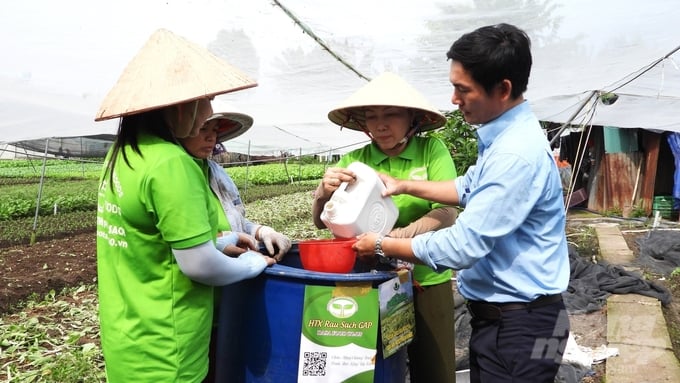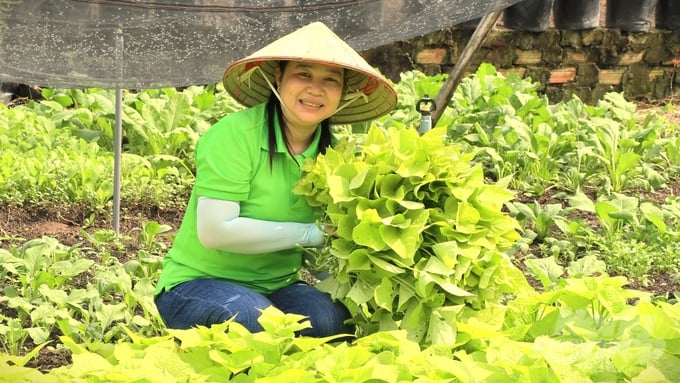November 27, 2025 | 14:40 GMT +7
November 27, 2025 | 14:40 GMT +7
Hotline: 0913.378.918
November 27, 2025 | 14:40 GMT +7
Hotline: 0913.378.918
The utilization of organic fertilizer, composed of microorganisms derived from various agricultural by-products, not only reduces the reliance on chemical fertilizers, ensuring the production of safe products, but also contributes to environmental conservation, cost savings, and increased profitability. Recognizing these benefits, Rasa Foods Cooperative has intensified its in-house production of organic fertilizer for use in its vegetable gardens, positioning itself as a model cooperative in the production of clean vegetables in the Hoc Mon district, Ho Chi Minh City.
Accompanied by officials from the Thoi Tam Thon Farmers' Association (Hoc Mon district), we visited Rasa Foods Cooperative at a time when the staff was actively collecting agricultural by-products for the organic fertilizer used in the cooperative's vegetable cultivation areas.

Composting organic fertilizer for 1 - 2 weeks makes it ready for use. Photo: Tran Trung.
Mr. Mai Van Khanh, Director of Rasa Foods Cooperative, expressed enthusiasm by stating that since its establishment, the cooperative has been steadfast in its goal of producing clean vegetables. Rooted in the philosophy of "giving back to the land what has been taken from it," the self-composting of organic microbial fertilizer has covered 60-70% of the material used, contributing to reduced production costs and increased economic efficiency.
According to Mr. Khanh, the method of producing organic microbial fertilizer is relatively straightforward. Simply by collecting agricultural by-products from the garden and combining them with a biological concoction containing beneficial microorganisms, the composting process can be completed within 1-2 weeks for immediate use.
"The use of organic fertilizer composted from organic waste during production and daily activities not only helps preserve the environment but also provides a rich source of nutrients for the soil, supplying perfect nutrition for plants. Additionally, organic fertilizer limits harmful pests by eliminating parasites and weed seeds. When using organic fertilizer, the need for irrigation is reduced, promoting an increased population of earthworms and beneficial microorganisms, creating loose, fertile soil," Mr. Khanh explained.
With the advantage of being located on the outskirts of Ho Chi Minh City, having the largest consumption market in the country, coupled with a systematic process from production to the dining table, Rasa Foods Cooperative has established a solid foothold in the market. The cooperative, which started with 7 members, has now grown to 12 members, cultivating an area exceeding 2 hectares.
Presently, the produce from the Cooperative has found its place in the most reputable clean food stores and supermarkets. Recently, the Cooperative's mustard green product was acknowledged with a 3-star OCOP (One Commune One Product) certification, and the Cooperative is diligently striving to attain a prestigious 4-star OCOP status by the year 2024.

Utilizing organic fertilizer from agricultural by-products helps produce safe and organic vegetable products. Photo: Tran Phi.
"The city is presently steering towards clean and green agriculture. This is one of the criteria that we aim for, and we hope for scientific support locally to develop products that are sustainable and enduring," shared Mr. Mai Van Khanh, Director of Rasa Foods Cooperative.
Mr. Doan Van Lanh, Chairman of the Thoi Tam Thon Farmers' Association, noted that Thoi Tam Thon is the "hub" of leafy vegetable production in Hoc Mon district. The trend of cultivating safe and organic vegetables is becoming an essential focus for local farmers, with Rasa Foods Cooperative leading the way in this field.
In recent years, agricultural input prices have frequently fluctuated upwards. Faced with significant cost pressures for production and a commitment to maintaining long-term, sustainable practices, leveraging organic fertilizer from agricultural by-products by Rasa Foods Cooperative appears to be the most optimal method. This not only helps farmers increase profits but also ensures the supply of organic and safe products to consumers.
"In the coming period, we will collaborate with Rasa Foods Cooperative to mobilize and guide local farmers on the techniques of composting agricultural by-products into organic fertilizer. This is also a way to help farmers produce in a safe, organic direction, contributing to elevating the local agricultural products. In recent years, the demand for safe, organic vegetables has become increasingly crucial for every family's kitchen. The movement to grow clean vegetables is gaining popularity, contributing to creating a 'green belt' for Ho Chi Minh City," emphasized Mr. Doan Van Lanh, Chairman of the Thoi Tam Thon Farmers' Association.
Translated by Linh Linh

(VAN) On the morning of November 27 in Beijing, Minister Tran Duc Thang and the Deputy Commissioner General of the General Administration of Customs of China signed a protocol on fresh jackfruit exports.

(VAN) As floodwaters recede, a vast network of irrigation works across eastern Gia Lai is emerging in a state of severe disrepair, with extensive damage demanding urgent restoration ahead of the 2025-2026 winter-spring cropping season.

(VAN) The conference reviewing three years of implementing Decision 911 identified the need to prioritize improving marine environmental quality and promoting sustainable fisheries development.

(VAN) Le Hoai Trung, Member of the Communist Party of Viet Nam Central Committee and Minister of Foreign Affairs, held talks with Vi Thao, Chairman of the Guangxi Zhuang Autonomous Region (China) this week.

(VAN) The Mekong River Commission adopts the 2026 - 2030 Strategic Plan with a people-centered approach.
/2025/11/26/1720-1-200855_132.jpg)
(VAN) Viet Nam and Japan have many conditions to expand cooperation on climate change adaptation, particularly in disaster risk management based on advanced technologies.

(VAN) The strong development of digital technology and artificial intelligence is opening up opportunities to transform science and technology into a 'Magic eye' for disaster forecasting and early warning.